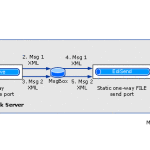Why Is DevOps The Next Step In Your Business Growth?
DevOps is a well-established methodology that significantly impacts the software development industry today. Businesses are incorporating DevOps into their technology projects to ensure optimal outcomes.
If you have never heard of DevOps before, let’s first see how Microsoft defines it: “DevOps combines development (Dev) and operations (Ops) to unite people, process, and technology in application planning, development, delivery, and operations. DevOps enables coordination and collaboration between formerly siloed roles like development, IT operations, quality engineering, and security.”
Also Read This: How Is Metaverse Going To Impact The Reality Of The World?
As previously mentioned, DevOps methodology combines all the teams and roles in developing a technology product. DevOps methodology is based on collaboration and coordination among various teams, including development, IT operations, quality engineering, and security. This approach ensures an efficient and error-free outcome for the organization, ultimately leading to better customer satisfaction.
DevOps In The Development Of Technological Products
Development can be attributed to its effectiveness in delivering a high-quality, error-free product. As per a survey by Statista in 2022, 47% of companies with software products claimed to use the DevOps methodology in their development process. This figure indicates that organizations around the world are increasingly embracing DevOps, and the rate of adoption is expected to accelerate even further.
Why Adopt The DevOps Methodology In Development Teams
Ensure System Uptime
As systems become more extensive, identifying problems becomes challenging for operations teams. Even with monitoring tools, they may have to seek assistance from IT support and customers to diagnose issues. This unreliable and time-consuming process causes prolonged system outages and failure to meet service-level agreements. Incorporating operational considerations from the beginning can significantly reduce the risk of expensive downtime and unsatisfied customers.
Run Your Business More Smoothly
When two teams work independently, they will inevitably encounter communication issues, and the problem is further exacerbated when a third team is added to the mix. Simplifying your departments can reduce time, complexity, and frustration. This approach eliminates communication barriers and ensures better team coordination, resulting in efficient and effective outcomes.
Build Better Software
Several software engineers should focus more on the ongoing operations of the systems they build, despite not being responsible. However, adopting a DevOps mindset makes them accountable for the system’s functions. When software engineers are called in the middle of the night to fix a broken system, it motivates them to take preventive measures to avoid future breakdowns.
This shift in mindset leads to the development of stable and reliable software systems, along with enhanced observability and traceability. Ultimately, organizations benefit from this approach, improving system performance and customer satisfaction.
Proper Resource Management
Specific tools and platforms can automate a significant portion of DevOps tasks, enabling engineers and technical staff to prioritize tasks that require manual intervention. Automation reduces the workload and saves time, allowing the team to focus on complex tasks that require human intervention. Hence, this approach guarantees the efficient completion of DevOps tasks, enhancing productivity and streamlining operations.
Tips For a Successful DevOps Implementation
Put The Right People In Right Place
Most organizations view operations as an IT administrative task and assign personnel accordingly. However, modern digital businesses now recognize that highly technical expertise is required for effective DevOps and are employing software engineers for these roles. To ensure success in DevOps, it’s essential to invest in hiring engineers with specialized operations skills or provide training for existing staff. This will help prevent staff frustration and ensure efficient and effective software development.
Change Mindsets
Bringing operations and development teams closer does not fully adopt a DevOps mindset. The key is to find common ground between the two. However, it’s important to note that you can only achieve this with the support and buy-in of your software engineers.
Prioritize Change
Implementing a transformation of any kind requires significant time and resources. However, it’s essential to recognize early on that DevOps is a crucial challenge that needs to be addressed rather than assuming that everything is functioning optimally. By acknowledging this challenge and prioritizing its resolution, organizations can maximize the value DevOps can bring to their operations.
The Best Platforms For DevOps
To maximize efficiency, a DevOps team must utilize appropriate tools. Therefore, experts suggest implementing modern and efficient platforms suitable for the team’s needs. These platforms should offer up-to-date features and functionality, enabling the team to carry out their tasks seamlessly and efficiently. With the right tools, the DevOps team can work collaboratively, streamline operations, and deliver high-quality products.
CircleCI
This platform is an excellent choice for DevOps workflows, offering continuous integration and deployment, along with the ability to host both mobile and web applications in various execution environments. Users can choose to deploy on-premises or in the cloud.
Jenkins
This platform is perfect for automating development workflows, including building, testing, and continuous integration and delivery, for detecting and correcting errors quickly. Because it simplifies the monitoring of repetitive tasks, issue identification, and integration of changes, making it easier for teams to collaborate and streamline their processes.
Meet The Future
DevOps is the natural evolution of modern businesses and reflects where the world is headed. While transitioning to DevOps can be a significant undertaking for most organizations, the rewards are well worth it. The benefits of adopting DevOps include faster updates, better products, more efficient teams, and improved reliability. By investing in DevOps and doing it right, businesses can significantly benefit both themselves and their customers, resulting in increased success and a better overall user experience.
Final Words
Creating a software product, whether a web or mobile application, can be a challenging process prone to unexpected delays and setbacks that can cause the estimated completion time to double. However, utilizing the DevOps approach throughout the development cycle can avoid these obstacles, and benefits can be realized even after the product is delivered. With continuous monitoring of user data and behaviour, DevOps can help improve the software product, ensuring that it performs optimally and provides the best possible user experience.







